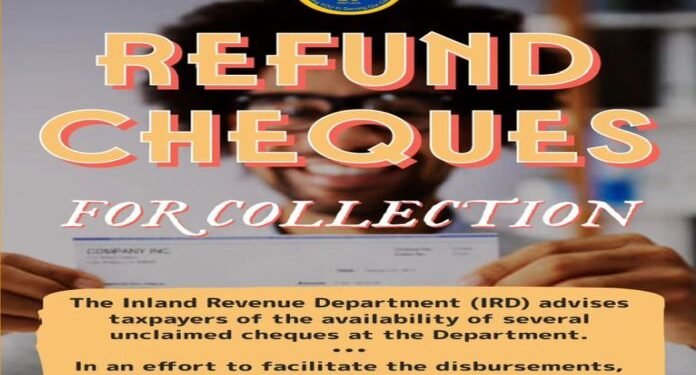- Given that the “economy is in good hands” and a forecast of 5.2 percent GDP for 2024, it would be a good idea to calculate interest on the ‘tax refund’ to taxpayers.
- The bottom line of this is essential to the efficient function of public finance management and policy directives.
- The inability of successive governments to pay tax returns from 2015 represents a dereliction of duty, and abuse, to withhold a non-negotiable tax-free loan.
- To withhold tax returns from 2015 is essentially an interest-free loan “compulsorily” withheld by the government.
By Caribbean News Global contributor
CASTRIES, St Lucia – ‘For the first time in Saint Lucia’s history, nearly $40 million in outstanding tax refunds will be paid out in a single financial year (2023/24),’ said the Office of the Prime Minister (OPM) in a statement December 6, 2023, declares ‘history in the making.’
“From July 2021 to December 2023, the Inland Revenue Department (IRD) will have disbursed $30 million in tax refunds.” However, there’s a caveat relevant to the distribution in time for the festive season and measures to possibly excite consumerism.
“The IRD will pay out $20 million in tax refunds between December 2023 and March 2024,” said the OPM in a promotional video.
In a prior press release, December 6, 2023, the OPM announced that the “government of Saint Lucia has secured $20 million to facilitate the payment of outstanding tax refunds dating back to financial year 2015.”
According to the OPM historic announcement:
“The government’s $20 million injection will accelerate the tax refund process and ensure thousands of Saint Lucians receive their outstanding tax refunds. This intervention is timely as it puts money back in the pockets of thousands of Saint Lucians for the holiday season and beyond.”
According to the government of Saint Lucia ‘historic tax refund’ playbook and by delineation of a desirable goal on procurement; and the protection or promotion in the interests of political gains, instructed that:
“The Inland Revenue Department (IRD) has received the funding for onward disbursement to eligible recipients commencing December 2023 and up to the end of the financial year in March 2024. The IRD is expected to payout nearly $10 million during the month of December 2023. The remaining $10 million will be disbursed by the IRD during the first quarter of 2024.”
The exercise of ‘history in the making’ with ‘tax refund’ in the context and method played out further stated that “ It is anticipated that by the end of March 2024, approximately $40 million in tax refunds will have been paid out to Saint Lucian taxpayers since July 2021.”
Extraordinary circumstances
A tax refund signifies money that the government reimburses to taxpayers who pay more than they are required to in taxes, relevant to their tax bracket.
Most tax refunds are issued within a few weeks of filing. A regular function of government, with nothing historical about that. Thus, to make hay subsequently is the acceptance of mediocrity. The allowance of disrespect to the principles of accountability and function of government. And, when played in the ambit of politics, is distasteful and runs afoul, ethics aside.
While there may be some instances where a tax refund takes longer than a few weeks (six weeks at the maximum), it is an extraordinary circumstance that the government of Saint Lucia has “outstanding tax refunds dating back to financial year 2015.”
Therefore, given that the “economy is in good hands” and a forecast of 5.2 percent GDP for 2024, it would be a good idea to calculate interest on the ‘tax refund’ to taxpayers.
The bottom line of this is essential to the efficient function of public finance management and policy directives. The inability of successive governments to pay tax returns from 2015 represents a dereliction of duty, and abuse, to withhold a non-negotiable tax-free loan.
To withhold tax returns from 2015 is essentially an interest-free loan “compulsorily” withheld by the government. Thus, instead of fluting with “history in the making” it is the responsibility of the government to refund taxpayers on time and without due harm.
Refunds are pleasant and nice. A bonus likewise. And certainly, a stroke of luck is welcome.
In the interest of accountability, consultation and transparency to the principles of public finance management, the government of Saint Lucia has not announced how and where it “secured $20 million to facilitate the ‘tax refund.’” Is it a grant? Is it another loan to pay a debt, that taxpayers are responsible for?

Saint Lucians expect their tax refund that is ‘already spent’, however, the Inland Revenue Department (IRD), says:
“In light of the unclaimed refund cheques announcement and the corresponding recipient list, the IRD is orchestrating a phased release of names. […] This systematic approach ensures a streamlined response to inquiries. We regret any inconvenience and appreciate your patience as we enhance our service for you.
Unprecedented history
The comments read, in part: “Why are there unclaimed cheques, I am sure that some of those people have been to the Department many times to check on their cheques, I think this department needs to update their taxpayers’ mailing addresses to prevent this from happening.” And, “It’s been two years am told I have something in the system it not bearing fruit.”
The priority calls to keep up with filing deadlines and the effort to refund taxpayers within a few weeks.
During this festive season, a busy time of the year, the government wants to play financial psychology with taxpayers, particularly those disadvantaged since 2015, by using tax refunds – in the game of political policy directives.
The ‘unprecedented history’ of patronage tax refunds calls for transitioning to a digital-first approach central to improving, expanding, and the avoidance of spreading financial psychology and playing Santa Claus with taxpayers’ refunds.










